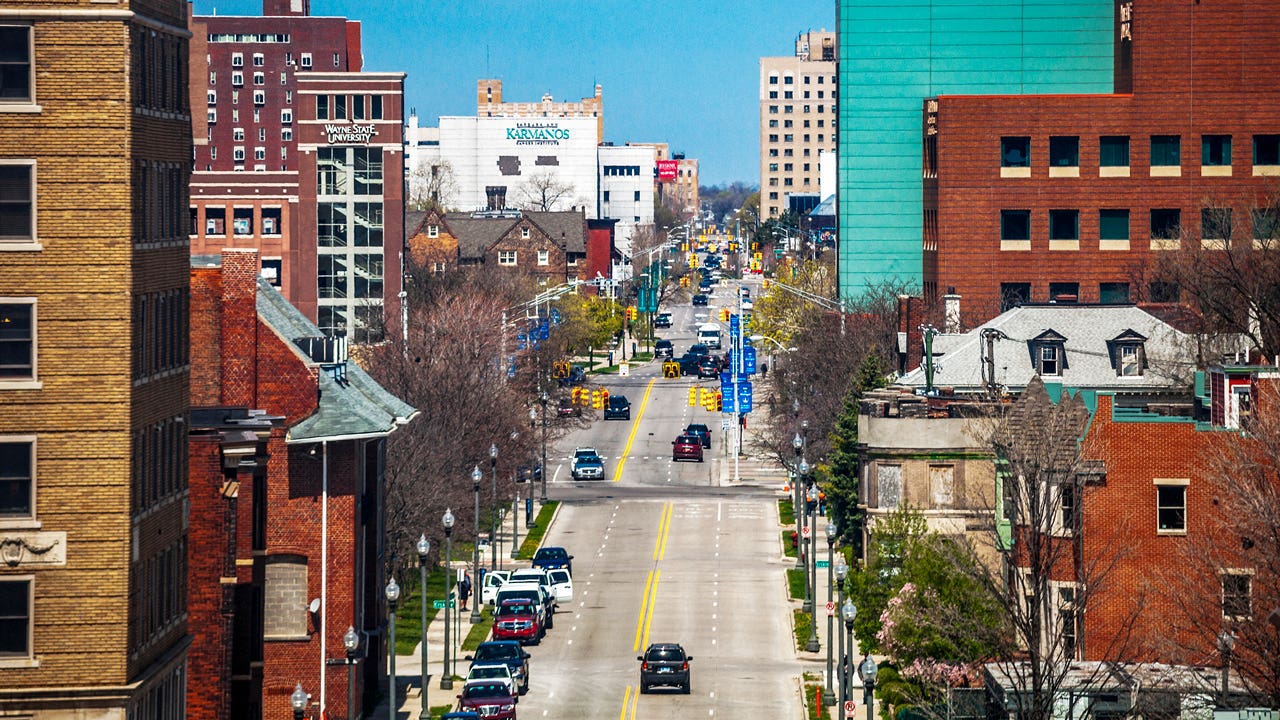Car insurance for high-risk drivers in Michigan

Key takeaways
- Full coverage rates increased 21 percent on average after a single speeding ticket in Michigan.
- DUI convictions are weighted the most heavily and could increase full coverage rates by 153 percent on average.
- In addition to moving violations, Michigan auto insurers look at a driver’s age, vehicle type, annual mileage and selected coverage to determine rates.
- High-risk drivers could save on auto insurance costs in Michigan by shopping around, comparing rates and taking advantage of discounts.
Michigan drivers with one or more moving violations on their driving records typically pay higher rates for car insurance — especially with a major offense like a DUI conviction. Drivers with checkered motor vehicle records are usually seen as higher risk by their insurance companies. With car insurance, higher risk usually translates to higher premiums. In some cases, a driver with significant violations may even be denied coverage by certain insurance carriers. Bankrate’s insurance editorial team offers a breakdown of how various incidents can impact a driver’s risk profile and the cost of their insurance in Michigan.
Rates for high-risk car insurance in Michigan
The cost of high-risk auto insurance in Michigan is determined by several variables. Generally, car insurance companies will analyze your age, vehicle type, annual mileage and the type and amount of coverage you choose, as well as your driving record. On average, drivers with clean driving records in Michigan pay $3,161 per year for full coverage car insurance, compared to the national average of $2,678.
Drivers with any violations typically pay higher rates, but the number and type of incidents that appear on your record will impact the cost of coverage. For instance, a single speeding ticket conviction may not have as significant of an impact on your rates as a single at-fault accident, but multiple speeding convictions within a short time frame could result in a much higher insurance premium.
Rates after a speeding ticket conviction
Bankrate’s study of quoted annual full coverage premiums found a speeding ticket in Michigan, on average, could cause your car insurance rates to go up by at least 21 percent. The average car insurance premium for Michigan drivers with a single speeding conviction is $3,813 per year. Nationally, a driver convicted of speeding pays an average of $3,270. On top of elevated insurance premiums, speeding in Michigan adds one to three points to your license, according to the state’s point system.
The table below compares average annual rates in Michigan for full coverage car insurance from various companies available to high-risk drivers in the state.
Michigan average annual full coverage premium
| Car insurance company | Rate before a speeding ticket conviction | Rate after a speeding ticket conviction | % increase |
|---|---|---|---|
| USAA | $1,730 | $2,236 | 29% |
| Auto-Owners | $2,402 | $2,801 | 17% |
| Grange | $2,826 | $3,078 | 9% |
| Farmers | $2,690 | $3,373 | 25% |
| Geico | $1,575 | $3,569 | 127% |
Auto insurance providers in Michigan use proprietary systems for determining rates and risk, separate from the state’s point system (although there is overlap), which means rates will vary among insurers for the same driver. In general, insurers will increase your premiums for each additional infraction or violation. Some insurers may even deny coverage altogether if you have too many traffic violations.
Rates after an at-fault accident
Causing an auto accident will generally amount to a significant increase in your car insurance premiums. Even in no-fault states like Michigan, being responsible for a collision can still result in substantial premium increases. The average cost of car insurance in Michigan for drivers with an at-fault accident is $4,640 per year for full coverage. By comparison, the national average rate for drivers with an at-fault accident is $3,857.
In line with the state’s no-fault system, Michigan car insurance laws require different coverage types than at-fault states. The term “no-fault” can be misleading, though. It primarily refers to how you file claims and which party’s insurance pays for medical costs; it does not mean that drivers in Michigan can’t be found at fault for an accident. We’ve outlined average premiums for some of the cheaper insurers after an at-fault accident in Michigan below.
Michigan average annual full coverage premium
| Car insurance company | Rate before an at-fault accident | Rate after an at-fault accident | % increase |
|---|---|---|---|
| USAA | $1,730 | $2,545 | 47% |
| Hastings Mutual | $1,593 | $2,738 | 72% |
| Auto-Owners | $2,402 | $2,801 | 17% |
| Wolverine Mutual | $2,607 | $3,340 | 28% |
| Geico | $1,575 | $4,165 | 164% |
Being a no-fault state means that your insurer will cover your medical expenses and lost wages following an accident, regardless of fault. However, exceptions may apply depending on the circumstances and the severity of injuries or the extent of damage. The financial consequences of causing an accident are often higher than for speeding. But like speeding, an at-fault accident will typically cause your rates to increase more each time you commit this infraction. Being at fault for numerous collisions within a three- to five-year period may cause your license to be suspended or make you ineligible for coverage with some providers.
Rates after a DUI
Driving while intoxicated is considered one of the most significant risks a driver can take on the road. Being convicted of a DUI will typically result in higher premium increases than any other type of infraction. On average, Michigan drivers with DUI convictions pay around $7,986 per year for full coverage, compared to $5,182 per year at the national level.
We found some of the cheapest average rates (as of March 2025) from car insurance companies in Michigan after a driver is convicted of a single DUI. Keep in mind, drivers with a DUI may not qualify for standard coverage in all cases, so it helps to speak with a licensed agent to check eligibility.
Michigan average annual full coverage premium
| Car insurance company | Rate before a DUI conviction | Rate after a DUI conviction | % increase |
|---|---|---|---|
| USAA | $1,730 | $3,131 | 81% |
| Progressive | $2,874 | $3,408 | 19% |
| Grange | $2,826 | $4,181 | 48% |
| Bristol West | $4,160 | $5,100 | 23% |
| Auto-Owners | $2,402 | $5,229 | 118% |
Beyond premium increases, Michigan’s impaired driving law imposes severe financial penalties on drivers with DUI convictions. First-time DUI offenders may face up to 180 days of jail time, $100 to $700 in fines and up to 360 hours of community service. Each subsequent offense increases the legal consequences, as does the severity of each penalty, which is outlined in Section 257.625 of the Michigan Vehicle Code. For instance, causing death or serious injury will typically lead to harsher consequences, including felony charges and fines up to $10,000 — even if it’s your first DUI.
Rates for teen drivers
Teen drivers are often charged more for insurance due to their relative lack of experience and higher statistical likelihood of experiencing auto incidents. In Michigan, on average, having a 16-year-old driver on your policy can more than double your car insurance premium.
Thankfully, age is one of the high-risk driving factors that generally resolves its impact on rates over time. As younger drivers age, they gain more experience behind the wheel and eventually join lower-risk age categories associated with lower rates, provided they maintain a clean driving record. In the meantime, policyholders with teens or young drivers may be able to take advantage of discounts for things like safe driving or maintaining good grades. We identified some of the cheaper average rates for married parents with a teen driver on their full coverage car insurance below to help you start your search.
Average annual full coverage premiums for policyholders
| Car insurance company | Rate without a 16-year-old insured* | Rate with a 16-year-old insured* | % increase |
|---|---|---|---|
| Geico | $1,575 | $3,106 | 97% |
| USAA | $1,730 | $3,404 | 97% |
| Hastings Mutual | $1,593 | $3,536 | 122% |
| Auto-Owners | $2,402 | $3,643 | 52% |
| Progressive | $2,874 | $4,708 | 64% |
| *Rates reflect the total average annual premium for a married couples’ full coverage policy with and without a 16-year-old driver added. |
Who is a high-risk driver in Michigan?
The industry standard classification for a high-risk driver is someone significantly more likely than others to file claims or lead to the filing of claims. Bankrate uses a more specific definition here, defining high-risk drivers as those with one of the following incidents on their driving record: speeding conviction, at-fault accident or DUI conviction. Drivers who have one or more of these incidents on their driving record can expect a higher-than-average cost of auto insurance. However, young drivers with limited driving experience are also commonly considered higher-risk drivers by most insurers, even if their driving records are clean. Some insurers may refuse to work with high-risk drivers, although this is largely dependent on the severity and number of marks a driver has on their motor vehicle record.
While Bankrate’s definition fits within the industry standard, it specifically applies to classifications that might affect insurance rates.
Does credit history matter in Michigan?
How to lower your rate if you are a high-risk driver
You can employ several tips and strategies to lower your auto insurance rates, even if you are a high-risk driver. Here are a few of the strategies to help lower your rate when searching for high-risk car insurance in Michigan.
- Shop around and compare rates between insurance companies to potentially find the same coverage for less.
- Check available discounts from your insurance provider. If you don’t qualify for any, see which ones would be the easiest and quickest to work toward. Comparing discounts when getting quotes is another way to determine the most affordable insurance company for your situation.
- Consider reduced coverage if you have more than Michigan’s mandatory minimum, as having less coverage means you’ll pay lower rates. However, you should consult with an agent to determine if this is right for your situation, as having less coverage can leave you financially vulnerable in the event of a serious accident.
- Opt to pay in full, automatically or online, as doing so often results in additional savings.
Frequently asked questions
Methodology
Bankrate utilizes Quadrant Information Services to analyze March 2025 rates for all ZIP codes and carriers in all 50 states and Washington, D.C. Rates are weighted based on the population density in each geographic region. Quoted rates are based on a single, 40-year-old male and female driver with a clean driving record, good credit and the following full coverage limits:
- $100,000 bodily injury liability per person
- $300,000 bodily injury liability per accident
- $50,000 property damage liability per accident
- $100,000 uninsured motorist bodily injury per person
- $300,000 uninsured motorist bodily injury per accident
- $500 collision deductible
- $500 comprehensive deductible
To determine minimum coverage limits, Bankrate used minimum coverage that meets each state’s requirements. Our base profile drivers own a 2023 Toyota Camry, commute five days a week and drive 12,000 miles annually.
These are sample rates and should only be used for comparative purposes.
Incidents: Rates were calculated by evaluating our base profile with the following incidents applied: clean record (base), at-fault accident, single speeding ticket and single DUI conviction.
Teens: Rates were determined by adding a 16- or 17-year-old teen to their 40-year-old married parents’ policy. The rates displayed reflect the total cost of a driver this age added to their parents’ policy.
Why we ask for feedback Your feedback helps us improve our content and services. It takes less than a minute to complete.
Your responses are anonymous and will only be used for improving our website.








